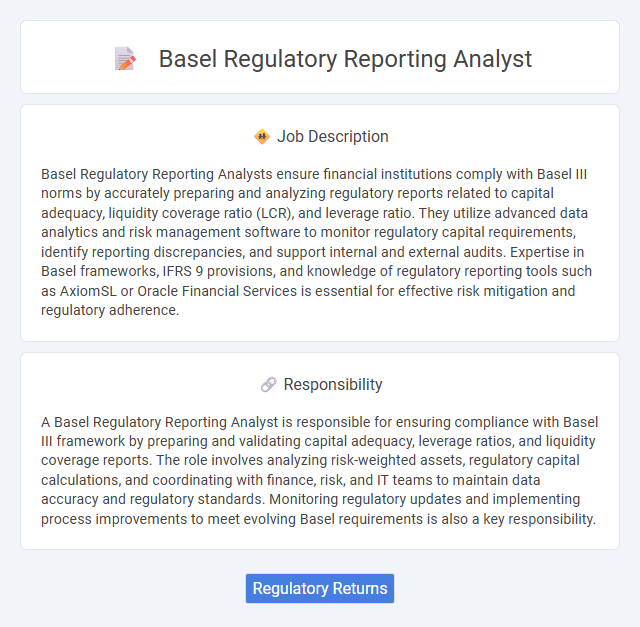
Basel Regulatory Reporting Analysts ensure financial institutions comply with Basel III norms by accurately preparing and analyzing regulatory reports related to capital adequacy, liquidity coverage ratio (LCR), and leverage ratio. They utilize advanced data analytics and risk management software to monitor regulatory capital requirements, identify reporting discrepancies, and support internal and external audits. Expertise in Basel frameworks, IFRS 9 provisions, and knowledge of regulatory reporting tools such as AxiomSL or Oracle Financial Services is essential for effective risk mitigation and regulatory adherence.
Candidates with strong analytical skills and attention to detail are likely suitable for a Basel Regulatory Reporting Analyst role, as it involves interpreting complex regulatory requirements and ensuring accurate data reporting. Those comfortable working in a fast-paced environment under tight deadlines may find this job fitting due to its demanding nature and need for precision. Individuals less adept at handling stress or lacking familiarity with financial regulations might struggle to meet the job's expectations.
Qualification
A Basel Regulatory Reporting Analyst requires deep knowledge of Basel III/IV frameworks, risk management principles, and financial regulations. Proficiency in data analysis tools such as SQL, Python, or Excel, along with experience in regulatory reporting platforms like Axiom or Wolters Kluwer, is essential. Strong analytical skills, attention to detail, and the ability to interpret complex regulatory guidelines ensure accurate and compliant reporting to regulatory authorities.
Responsibility
A Basel Regulatory Reporting Analyst is responsible for ensuring compliance with Basel III framework by preparing and validating capital adequacy, leverage ratios, and liquidity coverage reports. The role involves analyzing risk-weighted assets, regulatory capital calculations, and coordinating with finance, risk, and IT teams to maintain data accuracy and regulatory standards. Monitoring regulatory updates and implementing process improvements to meet evolving Basel requirements is also a key responsibility.
Benefit
Basel Regulatory Reporting Analyst roles likely offer significant career growth opportunities due to the high demand for compliance expertise in the financial industry. Professionals in this position probably benefit from increased job stability as regulatory frameworks continue to evolve globally. Expertise gained may also enhance salary prospects and open pathways to senior risk management or regulatory strategy roles.
Challenge
Basel Regulatory Reporting Analyst roles likely involve the challenge of ensuring accurate and timely compliance with complex regulatory frameworks such as Basel III. Professionals in this position probably face pressure to interpret evolving regulatory guidelines and transform vast datasets into precise risk and capital reports. Navigating the intersection of risk management, data analytics, and regulatory demands may require continuous adaptation and strong analytical skills.
Career Advancement
A Basel Regulatory Reporting Analyst plays a critical role in ensuring compliance with Basel III regulations by preparing accurate financial reports and risk metrics for regulatory authorities. Mastery of Basel frameworks and proficiency in data analysis tools can open pathways to senior risk management positions or strategic regulatory advisory roles within banking institutions. Continuous learning in regulatory updates and advanced analytical techniques significantly enhances prospects for leadership opportunities in financial compliance and risk governance.
Key Terms
Regulatory Returns
A Basel Regulatory Reporting Analyst specializes in preparing and validating regulatory returns to ensure compliance with Basel III framework requirements. They analyze financial data, including risk-weighted assets and capital adequacy ratios, to produce accurate reports for regulatory authorities like the Basel Committee on Banking Supervision. Proficiency in regulatory reporting tools and knowledge of banking regulations is essential for maintaining transparency and mitigating regulatory risks.
 kuljobs.com
kuljobs.com